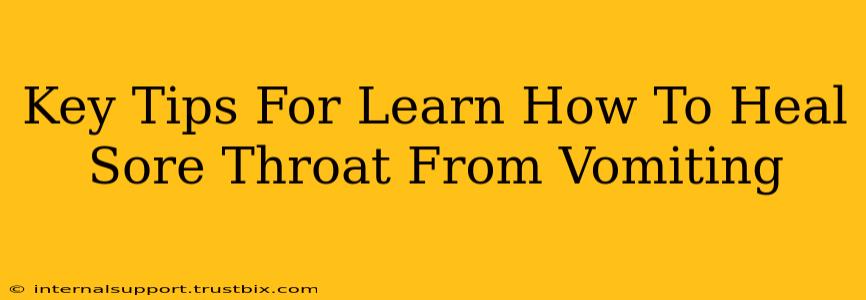A sore throat after vomiting is incredibly uncomfortable, often leaving you feeling drained and unable to swallow comfortably. While it's usually a temporary condition, knowing how to effectively soothe and heal your throat is crucial for faster recovery. This guide provides key tips to alleviate your discomfort and get you back on your feet.
Understanding the Sore Throat-Vomiting Connection
Vomiting is a forceful action that can irritate the delicate tissues of your throat. The acidic stomach contents, combined with repeated muscle contractions, can lead to inflammation, pain, and even scratchiness. This is why a sore throat often accompanies episodes of vomiting, regardless of the underlying cause of the vomiting itself.
Key Strategies for Healing Your Sore Throat After Vomiting
Here are some essential steps to take to heal your sore throat after a bout of vomiting:
1. Hydration is Key:
Sip, don't gulp: Dehydration exacerbates the problem. Drink plenty of fluids, but take small sips to avoid further irritating your throat. Water is best, but clear broths or electrolyte drinks can also help replenish lost fluids and electrolytes.
2. Rest Your Vocal Cords:
Silence is golden: Avoid talking as much as possible to give your throat a chance to rest and heal. Excessive talking can further strain the already irritated tissues.
3. Soothing Solutions:
- Warm salt water gargles: Dissolving ½ to ¾ teaspoon of salt in 8 ounces of warm water creates a soothing gargle that can help reduce inflammation and kill bacteria. Gargle gently several times a day.
- Honey: A spoonful of honey can coat and soothe your throat, providing temporary relief from pain. Honey has natural antibacterial properties.
- Herbal teas: Chamomile or ginger tea can be very soothing. Make sure the tea is lukewarm to avoid further irritation.
4. Avoid Irritants:
- Acidic foods and drinks: These can further aggravate your already sore throat. Avoid citrus fruits, juices, and spicy foods for a while.
- Alcohol and caffeine: These can dehydrate you and further irritate your throat.
- Smoking: If you smoke, avoid smoking until your throat heals completely.
5. Humidify the Air:
Dry air is your enemy: A dry environment can worsen throat irritation. Use a humidifier to add moisture to the air, especially at night.
6. Over-the-Counter Pain Relief:
Temporary relief: Over-the-counter pain relievers such as ibuprofen or acetaminophen can help manage pain and reduce inflammation. Always follow the recommended dosage. Consider throat lozenges or sprays for additional temporary relief.
7. When to See a Doctor:
Seek medical attention if:
- Your sore throat is severe or lasts longer than a week.
- You have difficulty breathing or swallowing.
- You have a high fever.
- You notice white patches or pus in your throat.
- You experience severe dehydration.
These symptoms could indicate a more serious condition requiring medical attention.
Boosting Your Immune System for Faster Healing
Strengthening your immune system can help your body fight off infections and heal more quickly. Ensure you're eating a nutritious diet rich in fruits, vegetables, and whole grains. Getting enough sleep and managing stress are also crucial for a healthy immune system.
By following these tips, you can effectively manage and heal your sore throat after vomiting, getting back to feeling your best faster. Remember that prevention is key, so maintaining good hygiene and overall health is essential in minimizing the chances of future occurrences.

